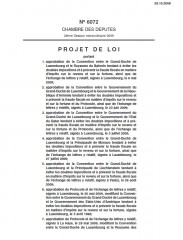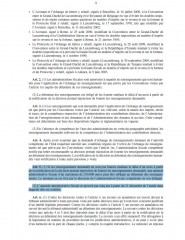11/14/2009
Madoff: UBS knew but this does not discharge a collective responsibility in Luxembourg
The French newspaper La Tribune has reported that in the third version of an internal operating memorandum, the name of Bernard Madoff is quoted more that twenty times whereas it appears neither in the prospectus nor in the subscription form even though the subscription form evokes a vague US broker.
And La Tribune to conclude that it is UBS' responsibility to compensate investors. So did many articles based on the operating memorandum.
The story is more complicated in the pragmatic jurisdiction.
La Tribune writes that « Pour sa défense, la banque suisse indique n'avoir qu'un rôle de 'surveillance' » (free translation: "For its defense, the Swiss bank indicates it had only a role of 'supervision'".
As I said, the Luxembourg regulation is influenced by local professionals:
This influence was admitted in 2005:
"The Luxembourg Investment Fund Industry has regularly had a very close and direct say on the evolution of the Luxembourg prudential regulatory environment governing the collective Investment Industry as well as on the introduction of new legislation in this specific field of financial product (...) This influence has been exerted directly and indirectly by the lobbying initiatives taken on the level of the different professional associations, be it ALFI or ABBL , but also and more importantly, trough a direct association with the Luxembourg Supervisory Authorities by means of a number of standing committees" (article "Shaping the regulatory environment". Fundlook, 2005)
Unfortunately nothing has changed and the business community continues on making laws and regulations.
"Shape regulation. An up-to-date, innovative legal and fiscal environment is critical to defend and improve Luxembourg's competitive position as a centre for the domiciliation, administration and distribution of investment funds. Strong relationships with regulatory authorities, the government and the legislative body enable ALFI to make an effective contribution to decision-making through relevant input for changes to the regulatory framework, implementation of European directives and regulation of new products or services."(Alfi brochure "Your bridge between Europe and China: Luxembourg", October 2009)
Among the professionals that influenced the regulator, was the former management of UBS-Luxalpha.
This influence of UBS, that had a direct say on the regulation in Luxembourg like every professional, is traced in the CSSF documents and especially in the composition of internal committees:
- Alain Hondequin, Executive Director, UBS (Luxembourg) S.A and Luxalpha director was member of the compliance Committee with reputable and competent professionals like Jean-Marie LEGENDRE (Chairman, Association of Compliance Officers), Vafa MOAYED (Partner - Reputation & Risk Leader, Deloitte) , Didier MOUGET (Territory Senior Partner, PwC), Jean-Jacques ROMMES, (Director, The Luxembourg Bankers' Association) Jean-Nicolas SCHAUS (General Manager, CSSF).
- Roger Hartmann, Managing Director, UBS (Luxembourg) S.A.and of Luxalpha was member of the Consultative committee Anti-Money Laundering with reputable and competent professionals like Jean-Jacques ROMMES (Director, The Luxembourg Bankers' Association), Thomas SEALE (former Chairman, ALFI), Lucien THIEL (former director, The Luxembourg Bankers' Association), Pierre Krier (Chairman, Institut des Réviseurs d'Entreprises) and of the Committee Banks with reputable and competent professionals Pierre KRIER (Chairman, Institut des Réviseurs d'Entreprises), Jean MEYER (Chairman, The Luxembourg Bankers' Association), Paul MOUSEL (Partner, Arendt & Medernach Law firm).
There is a collective responsibility in the wording that opened the drift with Madoff. Article 7 of the UCITS directive states that "1. A unit trust's assets must be entrusted to a depositary for safekeeping". The word "safekeeping" (that is missing is the French version of the article) was removed in the transposition (Cf. article 17 of the Luxembourg Law of 20 December 2002). Above all, Circular IMS 91/75 (as amended by Circular CSSF 05/177) dated 21 January 1991 states that "The concept of custody used to describe the general mission of the depositary should be understood not in the sense of "safekeeping", but in the sense of "supervision" (...) The depositary has discharged its duty of supervision when it is satisfied from the outset and during the whole of the duration of the contract that the third parties with which the assets of the UCI are on deposit are reputable and competent and have sufficient financial resources."
Madoff was reputable and competent and had sufficient financial resources, which may discharge UBS responsibility. This wording that created the current confusion is the result of the very close and direct say for a relevant input in the drafting of law and regulation.
La Tribune writes that « la réglementation européenne, qui s'applique aussi au Luxembourg, interdit la double fonction dépositaire-gérant. UBS Luxembourg ne pouvait pas ignorer le règlement. » (free translation: "the European regulation, which also applies to Luxembourg, prohibits the double role depositary-manager. UBS Luxembourg could not ignore the regulation")
As I said, this provision that is clearly stated in the UCITS directive, is not included in the Luxembourg law because of the business community very close and direct say for a relevant input in the drawing up of laws and regulation.
Article 10 of the UCIT directive states that " 1. No single company shall act as both management company and depositary". This provision is not in the Luxembourg text. This first paragraph was removed to only transpose literally paragraph 2 that states that "2. In the context of their respective roles the management company and the depositary must act independently and solely in the interest of the unit-holders." (Cf. article 20 of the Luxembourg law of 20 December 2002).
What is not clearly prohibited by the law is possible and UBS hence acted as both Management Company and depositary.
One can understand better what Claude Kremer, Chairman ALFI, said: " Nous sommes d'avis que le Luxembourg a transposé la directive comme il le fallait" (free translation : Our opinion is that Luxembourg transposed the directive as it was needed) (Source: Paperjam, 23 September 2009) :
"As it was needed" means the close and direct say for a relevant input for changes to the regulatory framework and implementation of European directives.
Read my detailed analysis abut the Luxembourg legal and regulatory framework for UCITS
07:34 Posted in Luxembourg | Permalink | Comments (0)
11/11/2009
Maximum Eur 250,000: the price to bypass tax agreements in Luxembourg?
A draft law is before the Chambre des Députés (Luxembourg legislature) to enforce agreements that Luxembourg signed based on OECD's Model Agreement on the Exchange of Information on Tax Matters.
The text states that the Luxembourg tax administration
- will examine the requests from foreign tax administration to assess if they comply with the law and the agreement, and if so
- will request officially (registered letter) the data from the entity.
Should the entity not provide the data within one month, it would be fined up to EUR 250,000 by the Luxembourg tax administration, on the director's discretion.
What does that mean from a practical point of view?
1. A fine is not coercive: why not introduce a criminal liability and authorise an investigation to look for the data?
2. This amount of EUR 250 000 is ridiculous when one knows the amounts of tax evasion and anyway is a maximum that will never be fined (See administrative fines by CSSF).
Above all, this fine is actually a way to bypass the agreements based on the OECD tax model. Luxembourg bankers are very creative. One can imagine a new service for clients that would be charged a fixed price of EUR 250,000 for the bank to keep secrecy ; and I do not think a new request from foreign tax administration on the same data will be accepted.
I will quote again ALFI in a recent brochure knoking that it is true as well for ABBL:
« Shape regulation. An up-to-date, innovative legal and fiscal environment is critical to defend and improve Luxembourg's competitive position as a centre for the domiciliation, administration and distribution of investment funds. Strong relationships with regulatory authorities, the government and the legislative body enable ALFI to make an effective contribution to decision-making through relevant input for changes to the regulatory framework, implementation of European directives and regulation of new products or services. »
(Source ALFI brochure: " Your bridge between Europe and China: Luxembourg".
This draft law is perfect implemnetation of that "influence" and explain the reason why many professionals communicate that the agreements do not change things for clients:
- money of evasion will be accepted
- there is a way in the law to keep secrecy
Let's read again what Angel Gurria said in the OECD press release dated 8 July 2009: “I commend Luxembourg for its swift implementation of the OECD standards on exchange of information. In three months, Luxembourg has turned into reality its commitment to fully cooperate in tax matters. I would like to congratulate Minister Luc Frieden for his leadership in this process”.
Fully cooperate ?
I wonder what is OECD's opinion (Pascal Saint Amans and Angel Gurria's opinion) about that?
09:45 Posted in Luxembourg | Permalink | Comments (0)
11/09/2009
Medellin drug cartel's money in Luxembourg: being fair with the jursisdiction
The media have reported that around 30 million US dollars of the Medellin drug cartel are still lying dormant since 1989 in several bank accounts worldwide of which in Switzerland, Panama and Luxembourg.
BGL and BNP Paribas confirmed, so did the Luxembourg prosecuting authorities.
This affair should not be used against Luxembourg for two reasons:
- on the one hand, in the 1980s and early 1990s Luxembourg demonstrated its commitment in the fight against money laundering in the framework of the Jurado affair : Etienne Schmit, who was deputy prosecuting attorney had said "We hope this makes the criminals understand that we do not want their money" (quoted by the New York Times);
- on the other hand, FATF was created later, in 1990 : AML rules were not defined when the money from the Medellin drug cartel was put in Luxembourg accounts.
In the context of the publication of the Financial Secrecy Index last week, the Medellin drug cartel's money should not be used as evidence in disfavour of the jurisdiction even though there were significant changes later towards the so-called pragmatism in the regiulation and the legislation.
17:50 Posted in Luxembourg | Permalink | Comments (0)








